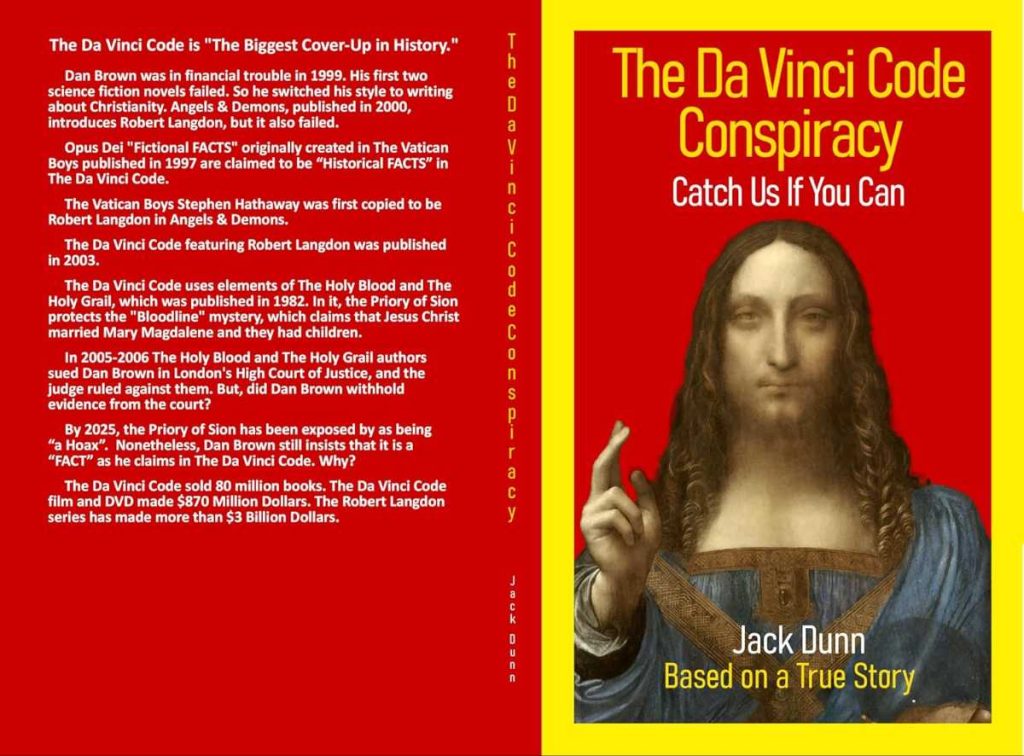Unveiling the Truth? The Shocking Book Dan Brown Doesn’t Want You to Read

Unveiling the Truth? The Shocking Book Dan Brown Doesn’t Want You to Read
The Da Vinci Code Conspiracy: Catch Us If You Can by Jack Dunn is shaking the literary world—and not without reason.
Published in September 2025, this explosive new book claims to expose one of the most controversial cover-ups in modern publishing history: the origins of Dan Brown’s blockbuster novel The Da Vinci Code. With meticulous documentation and firsthand accounts, Jack Dunn alleges that key elements of Brown’s global bestseller were lifted directly from his own 1997 novel The Vatican Boys—a work that predates Brown’s Angels & Demons and introduces eerily similar themes, characters, and plot twists.
But this isn’t just a story about literary theft. Dunn’s book digs deeper, challenging the public to reexamine the “truths” we were sold as fiction.
A Story Within a Story
Dunn paints a compelling timeline. According to him, Dan Brown was a struggling science fiction author in the late ’90s when he pivoted to writing religious thrillers—after allegedly reading The Vatican Boys. Dunn argues that the now-iconic Robert Langdon was based directly on his own character, Stephen Hathaway, and that Brown not only borrowed narrative style and structure, but even key plot mechanics—including the infamous Opus Dei and Priory of Sion conspiracies.
As the book outlines, lawsuits were filed. In 2006 and again in 2010, Dunn took his case to U.S. courts, but failed to secure a judgment in his favor. However, new evidence unearthed in The Da Vinci Code Conspiracy suggests that critical documents were overlooked—or deliberately hidden—during litigation.
And here’s the kicker: while the Priory of Sion was revealed as a 20th-century hoax, Brown still framed it as historical fact. Dunn argues that this not only deceived millions of readers, but turned fiction into faux-history, blurring the lines between entertainment and misinformation.
A Billion-Dollar Mystery
There’s no denying the cultural impact of The Da Vinci Code. The book sold over 80 million copies and spawned a $3 billion franchise—including films, merchandise, and a global tourism boom. But Dunn poses an uncomfortable question: What if this empire was built on someone else’s idea?
Whether you’re a long-time Langdon fan or a curious skeptic, The Da Vinci Code Conspiracy promises to reshape your view of one of the most iconic novels of the 21st century. It’s not just a tell-all. It’s a call for accountability—and a fascinating exploration of what happens when truth becomes stranger than fiction.
Will You Join the Hunt?
If you thought The Da Vinci Code was thrilling, wait until you discover the real story behind it. The Da Vinci Code Conspiracy: Catch Us If You Can isn’t just a book—it’s a literary reckoning 25 years in the making.
Available now wherever books are sold. Get your copy, and decide for yourself: Is this the biggest cover-up in publishing history?